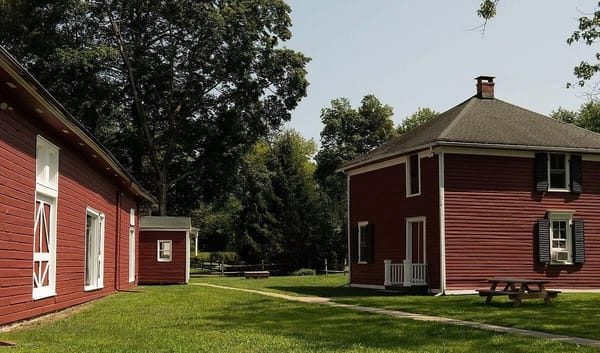
In last Sunday's New York Times Magazine Andrew Goldman revisited Mark Sanford, former governor of South Carolina, whose political career and marriage went down in flames when it came to light that he was having an affair with an Argentinian "soul mate." Since Turkana Farms' Mark Scherzer and Peter Davies are taking a week's break from blogging, we thought it timely to revisit Davies July 1, 2009 commentary on the matter. As we pointed out then, it's not every farming blogger who can do what Davies, a Yale-educated former English professor and dramaturg, has done: a deep reading of Sanford's e-mails that expose a far more alarming character flaw than mere philandering. Some of you may have read Governor Sanford's e-mails for their salacious content. We, on the other hand, read them for what they have to say about modern agriculture. We are all familiar with American Gothic, but South Carolina Governor Sanford in one of his e-mails to his lady in Argentina sent last July inadvertently defines what we might call, “Modern American Bucolic,” He wrote: > “Got back an hour ago to civilization and am now in Columbia after what was for me a glorious break from reality down at the farm. No phones ringing and tangible evidence of a day's labors. Though I have started every day by 6, this morning woke at 4:30, I guess since my body knew it was the last day, and I went out and ran the excavator with lights until the sun came up.” That his farm experience consists of running an excavator says something about him and possibly about what we have come to see as farming in today’s industrialized America. It all sounds much like George W. Bush’s favorite ranch chore, “clearing brush.” Clearing brush for what? Excavating for what? But it gets better. Sanford continues: “To me, and I suspect no one else on earth, there is something wonderful about listening to country music playing in the cab, air conditioner running, the hum of a huge diesel engine in the background, the tranquility that comes with being in a virtual wilderness of trees and marsh, the day breaking and vibrant pink coming alive in the morning clouds - and getting to build something with each scoop of dirt.” Country music playing, air conditioner running, the hum of a huge diesel engine and…. “tranquility!?” How, one wonders, does tranquility break through the din? How on earth, one might ask, is he alive to the dawning of the morning light, driving as he is with his headlights on? It reads to me like a modern advertising script selling big vehicles with all the accouterments by invoking imagery from once authentic Romantic ideals. Undoubtedly, the country music (heard, no doubt, through head phones) is faux, the windows are rolled up (to keep in the air conditioning), the hands on the steering wheel of a big roaring excavator are manicured. But somewhere in his trendy head the faint intimation, a vague sense, that one should, when in a landscape of “trees and marsh,” experience the tranquility of nature. Perhaps his distorted experience with nature mirrors the confusion of his moral and ethical standards. A family man, a devout Christian, a moral majority type, an outspoken critic of Clinton’s sexual antics—but also someone who, as it turns out, admits to dalliances over a twenty year period, and who is finally Tartuffe-like discovered to be having a passionate affair with his Argentine soul-mate.

But I digress. The image of him on his excavator with his headlights on also called to my mind our strangely unmechanized farm. Our lack of a tractor has caused consternation from several quarters. We have, for instance, had a farm laborer candidate refuse to work for us because we had no tractor. We have had the sons from a neighboring farm stop, barely veiling their condescension, to comment derisively on seeing us out working with a hoe and shovel. And we have had people come up to us at local social events to say satirically, “So, you are the Luddites.” While we are certainly not Luddites, I must admit that somewhere in my mind is a contrast between the fields and plots of traditional Anatolian Turkey (which I visit often), filled with bands of peasants planting, weeding, and hoeing, and the typical people-less American farm scene. On returning from a stay in Turkey I am always struck by the sterility of most American farms, where tractors and other farm vehicles move endlessly up and down row after row of soybeans or corn. Farming in America is no longer a hands on operation, not even in instances where it still could be. As we have found, the pressures to mechanize are great and the prejudice against actually doing handwork very strong to the point that much of what could be better and more cheaply done by hand must instead be done to the roar of a motor. This is not to say that there are not plenty of instances in which the use of a tractor at Turkana Farms is crucial. On that score we are quite pragmatic. When we need brush hogging done for instance, which involves hours of driving up and down the fields mowing the pastures, we call on near by neighbors with tractors who are always eager to make some extra money. And if we need 900-pound round bales moved or to have our massive compost pile turned, we, likewise, can call on our neighbor’s services. But on a day-to-day basis, we, along with our two farm helpers, manage with hand tools and garden carts to care for our forty acres and a menagerie of livestock. And, in this way, we do experience a good measure of tranquility—real, not faux, tranquility—and in every kind of light (except headlights) can fully appreciate the beauties of the natural world we seek to tame.
Turkish Whole Fava Bean Pods in Olive Oil For 1 lb. favas: 1/3 to ½ cup of olive oil in a cast iron skillet or heavy enameled pot with a tight-fitting cover Heat on a medium flame Add a couple of cloves of garlic, and once they have softened, add the fava bean pods. Toss in the oil to fully coat Turn heat to low, cover tightly and cook, stirring once or twice, for 10 to 15 minutes, until pods begin to turn a little yellow Then add boiling water to cover, the juice of one lemon, a tablespoon of sugar, salt and pepper to taste. Simmer uncovered on low flame for about 1 to 1 ½ hours, until beans are soft and liquid turns to a syrupy consistency Allow to cool; serve at room temperature, garnished with chopped dill.








